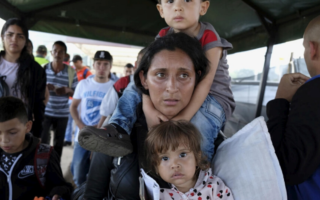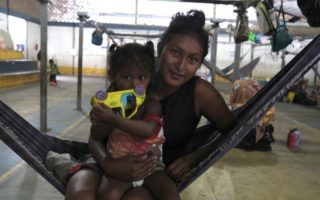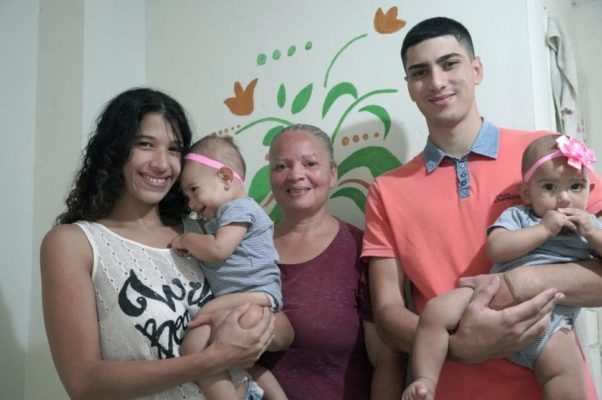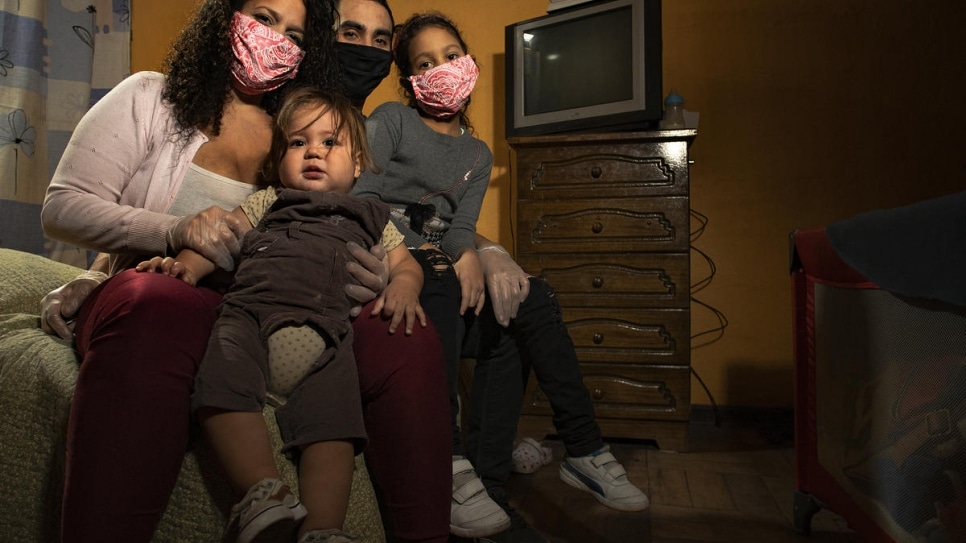
The upcoming Southern Hemisphere winter will be the first truly cold weather the Díaz family has ever experienced. © UNHCR/Hugo Fuentes
As chilly weather steals over South America, vulnerable Venezuelan refugees and migrants brace for added hardship.
Several difficult months after the Díaz family arrived in Chile, following a gruelling, 7,000-kilometre-long overland journey from their home in Venezuela, they finally achieved a degree of stability. Eileen, the mother, had given birth to a healthy baby boy, and the father, José Domingo, had just secured a job in the Chilean capital, Santiago. Then came the coronavirus pandemic, knocking the family back to square one.
José Domingo lost his job, and simply covering basic necessities, like food and rent, became all but impossible for the family of four.
And just when it seemed that things could hardly get any worse, temperatures started to drop with the approach of the biting Southern Hemisphere winter, which runs from June through September.
“We’re really worried about the winter … because it’s going to be the first time we’ve experienced cold weather,” said Eileen, adding that back home in Caracas, midwinter temperatures rarely dip below 17 degrees Celsius. In Santiago, by contrast, low temperatures in the single digits are the norm in winter. “We’re not prepared. We didn’t have heavy coats or heating, or even blankets.”
Coming on the heels of the COVID-19 pandemic, the approaching winter is yet another source of anxiety for many of the more than five million Venezuelans living outside their country amid the ongoing crisis back home.
“We’re really worried about the winter … because it’s going to be the first time we’ve experienced cold weather.”
The coronavirus pandemic has taken a major toll across the globe, costing millions of jobs worldwide and throwing the economy into recession. A United Nations estimate warns that the pandemic and the stay-at-home orders aimed at staunching the virus’ spread could plunge half a billion people into poverty by the end of this year.
Refugees tend to be even more vulnerable than the population at large to the effects of the crisis. Often living in crowded, sub-par housing and scraping by with precarious work in the informal sector, they are particularly ill-equipped both to take contagion-prevention measures and to weather the financial fallout of quarantine. Thousands are grappling with the terrible choice between going hungry and defying stay-at-home orders to hawk or beg in the streets. With no money coming in to pay rent, many have already been evicted and are struggling to survive on the streets.
And because Venezuelans refugees and migrants are fleeing food shortages, as well as widespread inflation and insecurity back home, they are often in precarious health, with weak immune systems that put them at increased risk from the virus.
The Southern Hemisphere winter, therefore, could not come at a worse time for the over 1.5 million Venezuelans living in the five Southern Cone nations at the tip of South America and in the Andean nation of Peru, where winter weather is similarly frigid.
“We’re upset because the pandemic really changed our lives for the worse,” said Eileen, a 30-year-old chef who owned a small business back in Caracas. “We had been making great strides towards our objectives but, unfortunately, the coronavirus completely derailed us.”
José Ignacio Peralta, who works in Santiago for the charity World Vision International, warned that winter months are likely to bring not only an uptick of coronavirus infections but also a host of other cold-weather afflictions.
“On top of COVID-19, we’re going to see a bunch of other respiratory illnesses such as flu, which will cause a surge in the need for medical attention,” he said. “We also expect an increase in families in need of housing assistance, hot meals and cold-weather gear.”
Fortunately, Eileen and her family were among hundreds of Venezuelan refugees and migrants in need to receive special winter-months assistance from UNHCR, the UN Refugee Agency, and its partner in Chile, World Vision. Nearly 800 electronic vouchers have been distributed to families, like the Díazes, to allow them to buy heaters, blankets and warm clothing using a bar code delivered remotely, by email.
In Chile and beyond, UNHCR is also ramping up rental subsidies, to ensure vulnerable families are able to keep a roof over their heads, and also distributing food baskets, hygiene kits and blankets.
“On top of COVID-19, we’re going to see a bunch of other respiratory illnesses.”
Given the sheer scale of needs – exacerbated by the dual challenges of the pandemic and the approaching winter – support for humanitarian operations is critical. UNHCR’s response plan for Venezuelan refugees and migrants is dangerously underfunded, with only 12 per cent of the requested funds received to date.
An International Donors Conference in solidarity with Venezuelan refugees and migrants took place virtually on 26 May. Representatives from over 60 countries, as well as agencies of the United Nations, international financial institutions and civil society, gathered to address this unprecedented crisis, mobilise resources for the displaced population and the main host communities, and strengthen coordination among the key players.
The looming Southern Hemisphere winter only intensifies the difficulties facing displaced Venezuelans, UNHCR spokesperson Shabia Mantoo told a news briefing in Geneva on Friday.
“In addition to health risks, COVID-related lockdowns and confinement measures have already resulted in severe hardship for Venezuelan refugee and migrants,” she said. “With the approaching cold weather, UNHCR is bracing for a deepening of the crisis.”
Maritza Pino Zambrano, a 37-year-old former bakery employee from western Venezuela, was trying to see the silver lining of the pandemic, which cost her her job at a restaurant in the Andean city of Cusco, Peru, where she and her family have found safety.
Winters in the city of Cusco – which is perched at an altitude of nearly 3,400 metres – are notoriously brutal. Martiza tried to console herself with the thought that losing her job meant that at least she will no longer have to brave the elements on her way to and from work and can stay bundled up in the small room she shares with husband and the couple’s 10-year-old son.
“Once you go outside, you can get sick and then pass the illness to the whole family,” she said.
Still, the reality of the family’s situation is overwhelming. They are scraping by on the few dollars her mechanic husband brings home from the occasional odd job, in addition to humanitarian aid they have received from UNHCR and other groups.
“We feel like we have a noose around our necks,” said Maritza. “I’m praying it all ends.”
Originally published on UNHCR on 29 May 2020
